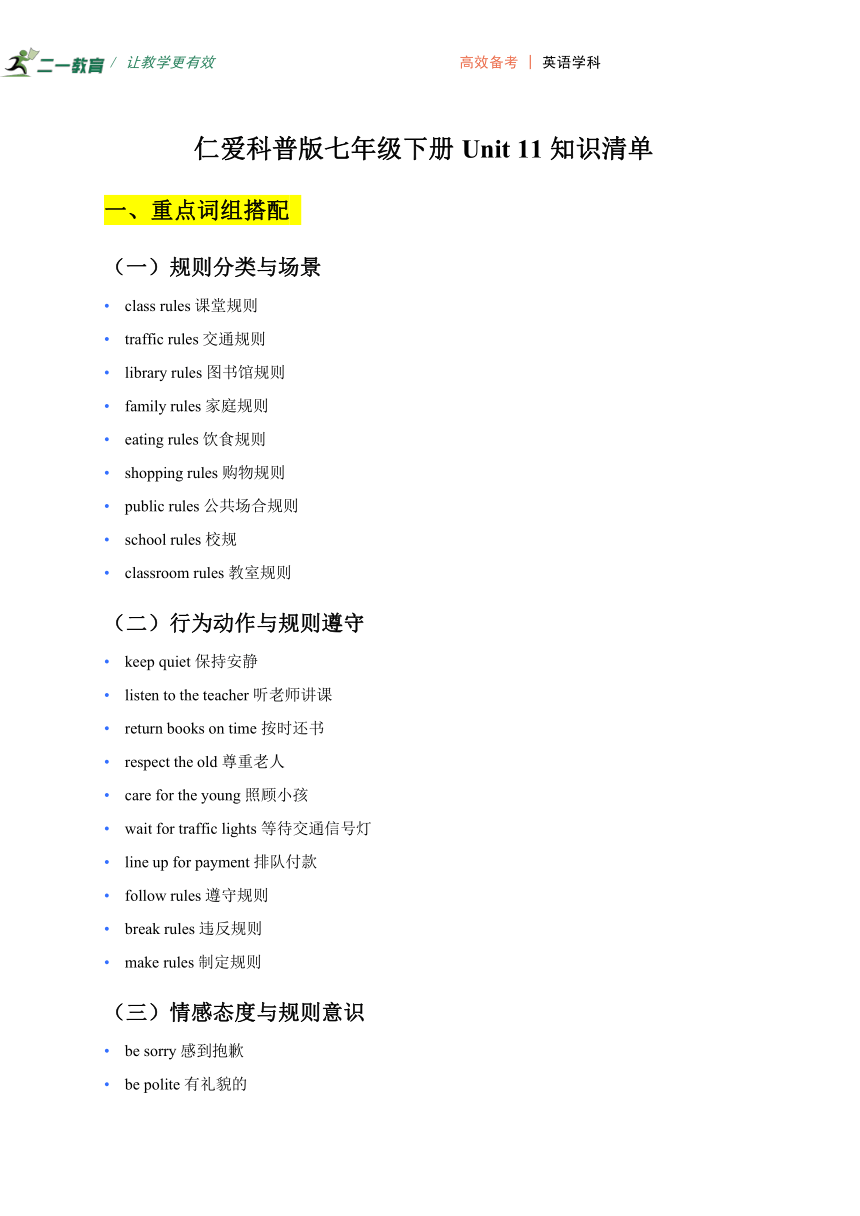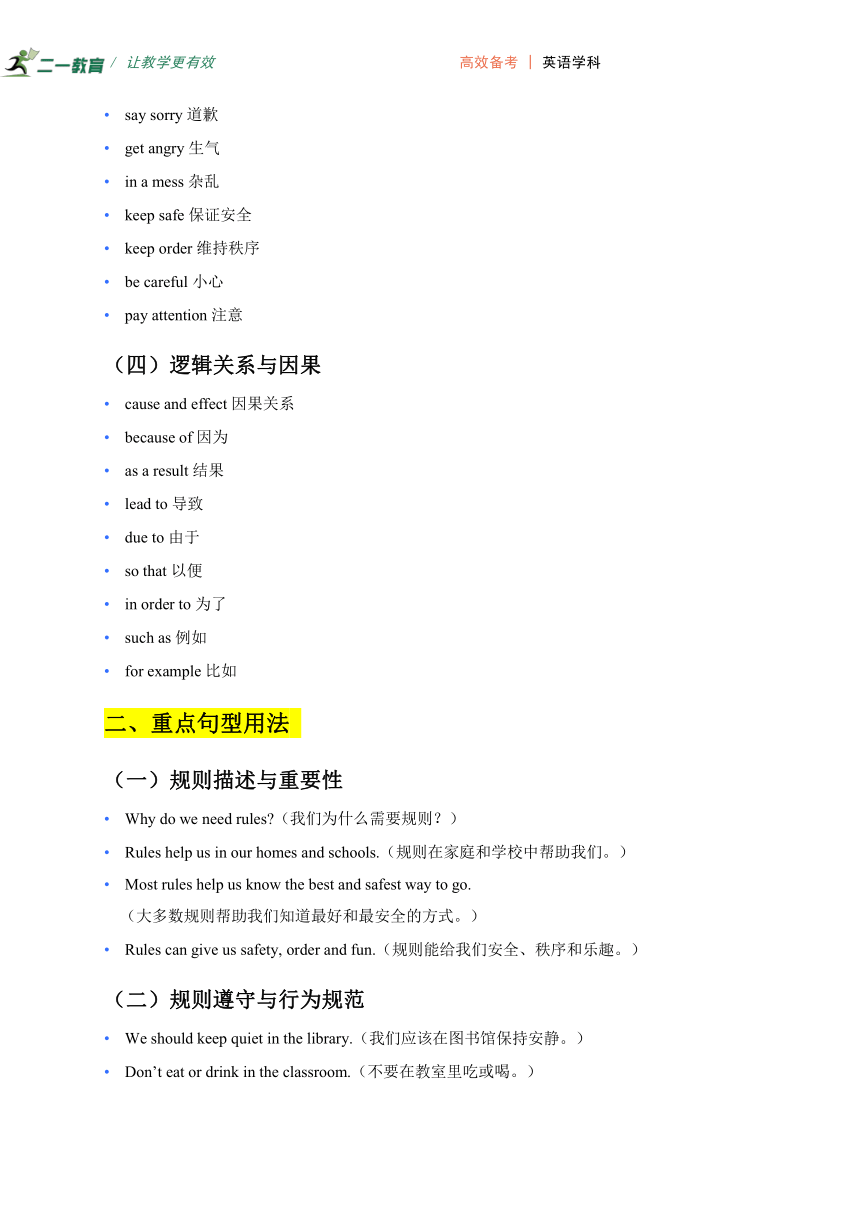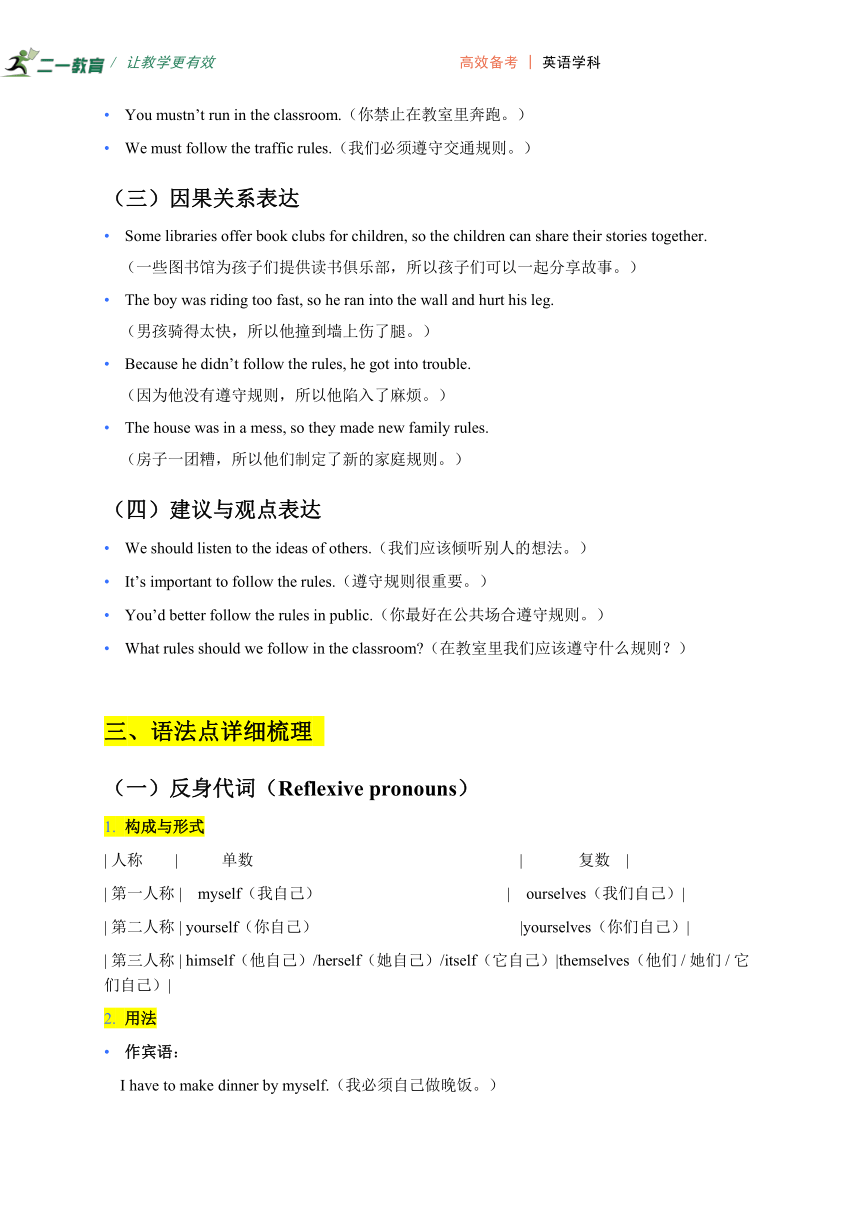Unit 11 Rules Matter!知识清单学案【仁爱科普版七年级下册英语】
文档属性
| 名称 | Unit 11 Rules Matter!知识清单学案【仁爱科普版七年级下册英语】 |  | |
| 格式 | docx | ||
| 文件大小 | 36.8KB | ||
| 资源类型 | 试卷 | ||
| 版本资源 | 仁爱科普版 | ||
| 科目 | 英语 | ||
| 更新时间 | 2025-05-28 20:39:28 | ||
图片预览



文档简介
/ 让教学更有效 高效备考 | 英语学科
仁爱科普版七年级下册 Unit 11 知识清单
一、重点词组搭配
(一)规则分类与场景
class rules 课堂规则
traffic rules 交通规则
library rules 图书馆规则
family rules 家庭规则
eating rules 饮食规则
shopping rules 购物规则
public rules 公共场合规则
school rules 校规
classroom rules 教室规则
(二)行为动作与规则遵守
keep quiet 保持安静
listen to the teacher 听老师讲课
return books on time 按时还书
respect the old 尊重老人
care for the young 照顾小孩
wait for traffic lights 等待交通信号灯
line up for payment 排队付款
follow rules 遵守规则
break rules 违反规则
make rules 制定规则
(三)情感态度与规则意识
be sorry 感到抱歉
be polite 有礼貌的
say sorry 道歉
get angry 生气
in a mess 杂乱
keep safe 保证安全
keep order 维持秩序
be careful 小心
pay attention 注意
(四)逻辑关系与因果
cause and effect 因果关系
because of 因为
as a result 结果
lead to 导致
due to 由于
so that 以便
in order to 为了
such as 例如
for example 比如
二、重点句型用法
(一)规则描述与重要性
Why do we need rules (我们为什么需要规则?)
Rules help us in our homes and schools.(规则在家庭和学校中帮助我们。)
Most rules help us know the best and safest way to go.
(大多数规则帮助我们知道最好和最安全的方式。)
Rules can give us safety, order and fun.(规则能给我们安全、秩序和乐趣。)
(二)规则遵守与行为规范
We should keep quiet in the library.(我们应该在图书馆保持安静。)
Don’t eat or drink in the classroom.(不要在教室里吃或喝。)
You mustn’t run in the classroom.(你禁止在教室里奔跑。)
We must follow the traffic rules.(我们必须遵守交通规则。)
(三)因果关系表达
Some libraries offer book clubs for children, so the children can share their stories together.
(一些图书馆为孩子们提供读书俱乐部,所以孩子们可以一起分享故事。)
The boy was riding too fast, so he ran into the wall and hurt his leg.
(男孩骑得太快,所以他撞到墙上伤了腿。)
Because he didn’t follow the rules, he got into trouble.
(因为他没有遵守规则,所以他陷入了麻烦。)
The house was in a mess, so they made new family rules.
(房子一团糟,所以他们制定了新的家庭规则。)
(四)建议与观点表达
We should listen to the ideas of others.(我们应该倾听别人的想法。)
It’s important to follow the rules.(遵守规则很重要。)
You’d better follow the rules in public.(你最好在公共场合遵守规则。)
What rules should we follow in the classroom (在教室里我们应该遵守什么规则?)
三、语法点详细梳理
(一)反身代词(Reflexive pronouns)
构成与形式
| 人称 | 单数 | 复数 |
| 第一人称 | myself(我自己) | ourselves(我们自己)|
| 第二人称 | yourself(你自己) |yourselves(你们自己)|
| 第三人称 | himself(他自己)/herself(她自己)/itself(它自己)|themselves(他们 / 她们 / 它们自己)|
用法
作宾语:
I have to make dinner by myself.(我必须自己做晚饭。)
We should wash the clothes by ourselves.(我们应该自己洗衣服。)
作表语:
The car can drive itself.(这辆车能自动驾驶。)
Xiao Fang teaches herself French.(小芳自学法语。)
作同位语:
Tell yourself to be careful.(告诉自己要小心。)
The family are enjoying themselves.(这家人正玩得开心。)
固定搭配:by oneself(独自), enjoy oneself(玩得开心),
teach oneself(自学), help oneself to(随便吃 / 用)
(二)情态动词 must/mustn’t 与 should/shouldn’t
must 与 mustn’t
must:表示 “必须”,强调义务或必要。
We must follow the traffic rules.(我们必须遵守交通规则。)
Drivers must tell themselves never to break rules.(司机必须告诉自己绝不违反规则。)
mustn’t:表示 “禁止”,强调不允许。
You mustn’t play with fire.(你禁止玩火。)
We mustn’t run in the classroom.(我们禁止在教室奔跑。)
should 与 shouldn’t
should:表示 “应该”,建议或责任。
We should respect the old.(我们应该尊重老人。)
You should listen to the teacher carefully.(你应该认真听老师讲课。)
shouldn’t:表示 “不应该”,建议不要做。
You shouldn’t eat in the classroom.(你不应该在教室吃东西。)
We shouldn’t break the law.(我们不应该违反法律。)
区别与注意
must 语气比 should 更强,must 表示 “必须”,should 表示 “应该”。
mustn’t 表示 “绝对禁止”,shouldn’t 表示 “不建议”。
must 的否定回答常用 needn’t(不必),如 Must I finish it now No, you needn’t.
(三)因果关系表达(Cause and effect)
常用连接词
表示原因:because, because of, due to, as, since
表示结果:so, so that, therefore, as a result, lead to
句型结构
"原因 + so + 结果":
He didn’t follow the rules, so he got into trouble.(他没遵守规则,所以陷入麻烦。)
"Because + 原因,结果":
Because the boy was riding too fast, he hurt his leg.(因为男孩骑得太快,所以伤了腿。)
"结果 + because of + 原因":
The accident happened because of his carelessness.(事故因他的粗心发生。)
"原因 + lead to + 结果":
Breaking rules can lead to bad results.(违反规则会导致不良结果。)
四、本单元话题书面表达写作指导学案
(一)写作结构
引言(Introduction):引出规则的主题,提出论点,如 “Rules are important in our life.”
主体(Main body)
分论点 1:规则保障安全,举例说明,如交通规则避免事故。
分论点 2:规则维持秩序,举例说明,如图书馆规则创造良好环境。
分论点 3:规则带来乐趣,举例说明,如游戏规则让游戏公平有趣。
结论(Conclusion):总结观点,强调遵守规则的重要性,呼吁大家自觉遵守。
(二)写作要点
细节与例子
引用课文例子:如王军峰提醒同学遵守课堂规则,男孩骑车事故的因果分析。
结合生活实际:如自己在图书馆遵守安静规则的经历,家庭中帮忙做家务的规则。
逻辑衔接
表示顺序:first, second, finally
表示因果:because, so, as a result
表示举例:for example, such as
表示总结:in conclusion, all in all
语言准确
正确使用本单元重点词组:follow rules, keep quiet, respect the old, cause and effect 等。
正确使用语法点:反身代词,must/mustn’t, should/shouldn’t,因果关系表达。
观点明确
议论文明确支持或反对的观点,如 “Rules are necessary for a better life.”
记叙文突出规则对自己的影响或启示,如 “From this experience, I learned to follow rules.”
(三)写作示例(Why should we follow rules )
大纲——Outline
Title
(题目) Why should we follow rules
(我们为什么要遵守规则?)
Introduction
(引文) Rules are everywhere in our life. They are important for everyone.
(规则在我们的生活中无处不在。它们对每个人都很重要。)
Main body(主体)
Rules keep us safe. For example, traffic rules help us avoid accidents.2. Rules keep things in order. In the library, we should keep quiet to let others study well.3. Rules bring us fun. When playing games, fair rules make the game interesting.
(1. 规则保证我们的安全。例如,交通规则帮助我们避免事故。2. 规则使事情井然有序。在图书馆里,我们应该保持安静,好让别人好好学习。3. 规则给我们带来乐趣。在玩游戏时,公平的规则会让游戏变得有趣。)
Conclusion
(结论) Rules are important. We should follow them to have a better life.(规则很重要。我们应该遵守规则,从而过上更好的生活。)
参考范文
Why should we follow rules
Rules are everywhere in our life. We can find them in schools, at home, and in public places. They are very important for everyone, and we should follow them.
First, rules keep us safe. When we cross the road, we must follow the traffic lights. In this way, we can keep away from traffic accidents. Last week, I saw a boy riding his bike too fast. He didn’t stop when the light was red, so he ran into a car. He was hurt badly. This shows how important traffic rules are.
Second, rules keep things in order. For example, in the library, we shouldn’t eat, drink or make noise. In a quiet environment, people can study or work better. Once, some students talked loudly in the library, so others couldn’t read books. The librarian had to ask them to keep quiet.
Third, rules can bring us more fun. When we play games, we should follow the rules. A game is fun when it is fair. My friends and I often play basketball. We always follow the rules, so we enjoy the game and never get angry with each other.
In conclusion, rules are important in our life. They can give us safety, order and fun. We should follow the rules in our hearts to have a better life.
仁爱科普版七年级下册 Unit 11 知识清单
一、重点词组搭配
(一)规则分类与场景
class rules 课堂规则
traffic rules 交通规则
library rules 图书馆规则
family rules 家庭规则
eating rules 饮食规则
shopping rules 购物规则
public rules 公共场合规则
school rules 校规
classroom rules 教室规则
(二)行为动作与规则遵守
keep quiet 保持安静
listen to the teacher 听老师讲课
return books on time 按时还书
respect the old 尊重老人
care for the young 照顾小孩
wait for traffic lights 等待交通信号灯
line up for payment 排队付款
follow rules 遵守规则
break rules 违反规则
make rules 制定规则
(三)情感态度与规则意识
be sorry 感到抱歉
be polite 有礼貌的
say sorry 道歉
get angry 生气
in a mess 杂乱
keep safe 保证安全
keep order 维持秩序
be careful 小心
pay attention 注意
(四)逻辑关系与因果
cause and effect 因果关系
because of 因为
as a result 结果
lead to 导致
due to 由于
so that 以便
in order to 为了
such as 例如
for example 比如
二、重点句型用法
(一)规则描述与重要性
Why do we need rules (我们为什么需要规则?)
Rules help us in our homes and schools.(规则在家庭和学校中帮助我们。)
Most rules help us know the best and safest way to go.
(大多数规则帮助我们知道最好和最安全的方式。)
Rules can give us safety, order and fun.(规则能给我们安全、秩序和乐趣。)
(二)规则遵守与行为规范
We should keep quiet in the library.(我们应该在图书馆保持安静。)
Don’t eat or drink in the classroom.(不要在教室里吃或喝。)
You mustn’t run in the classroom.(你禁止在教室里奔跑。)
We must follow the traffic rules.(我们必须遵守交通规则。)
(三)因果关系表达
Some libraries offer book clubs for children, so the children can share their stories together.
(一些图书馆为孩子们提供读书俱乐部,所以孩子们可以一起分享故事。)
The boy was riding too fast, so he ran into the wall and hurt his leg.
(男孩骑得太快,所以他撞到墙上伤了腿。)
Because he didn’t follow the rules, he got into trouble.
(因为他没有遵守规则,所以他陷入了麻烦。)
The house was in a mess, so they made new family rules.
(房子一团糟,所以他们制定了新的家庭规则。)
(四)建议与观点表达
We should listen to the ideas of others.(我们应该倾听别人的想法。)
It’s important to follow the rules.(遵守规则很重要。)
You’d better follow the rules in public.(你最好在公共场合遵守规则。)
What rules should we follow in the classroom (在教室里我们应该遵守什么规则?)
三、语法点详细梳理
(一)反身代词(Reflexive pronouns)
构成与形式
| 人称 | 单数 | 复数 |
| 第一人称 | myself(我自己) | ourselves(我们自己)|
| 第二人称 | yourself(你自己) |yourselves(你们自己)|
| 第三人称 | himself(他自己)/herself(她自己)/itself(它自己)|themselves(他们 / 她们 / 它们自己)|
用法
作宾语:
I have to make dinner by myself.(我必须自己做晚饭。)
We should wash the clothes by ourselves.(我们应该自己洗衣服。)
作表语:
The car can drive itself.(这辆车能自动驾驶。)
Xiao Fang teaches herself French.(小芳自学法语。)
作同位语:
Tell yourself to be careful.(告诉自己要小心。)
The family are enjoying themselves.(这家人正玩得开心。)
固定搭配:by oneself(独自), enjoy oneself(玩得开心),
teach oneself(自学), help oneself to(随便吃 / 用)
(二)情态动词 must/mustn’t 与 should/shouldn’t
must 与 mustn’t
must:表示 “必须”,强调义务或必要。
We must follow the traffic rules.(我们必须遵守交通规则。)
Drivers must tell themselves never to break rules.(司机必须告诉自己绝不违反规则。)
mustn’t:表示 “禁止”,强调不允许。
You mustn’t play with fire.(你禁止玩火。)
We mustn’t run in the classroom.(我们禁止在教室奔跑。)
should 与 shouldn’t
should:表示 “应该”,建议或责任。
We should respect the old.(我们应该尊重老人。)
You should listen to the teacher carefully.(你应该认真听老师讲课。)
shouldn’t:表示 “不应该”,建议不要做。
You shouldn’t eat in the classroom.(你不应该在教室吃东西。)
We shouldn’t break the law.(我们不应该违反法律。)
区别与注意
must 语气比 should 更强,must 表示 “必须”,should 表示 “应该”。
mustn’t 表示 “绝对禁止”,shouldn’t 表示 “不建议”。
must 的否定回答常用 needn’t(不必),如 Must I finish it now No, you needn’t.
(三)因果关系表达(Cause and effect)
常用连接词
表示原因:because, because of, due to, as, since
表示结果:so, so that, therefore, as a result, lead to
句型结构
"原因 + so + 结果":
He didn’t follow the rules, so he got into trouble.(他没遵守规则,所以陷入麻烦。)
"Because + 原因,结果":
Because the boy was riding too fast, he hurt his leg.(因为男孩骑得太快,所以伤了腿。)
"结果 + because of + 原因":
The accident happened because of his carelessness.(事故因他的粗心发生。)
"原因 + lead to + 结果":
Breaking rules can lead to bad results.(违反规则会导致不良结果。)
四、本单元话题书面表达写作指导学案
(一)写作结构
引言(Introduction):引出规则的主题,提出论点,如 “Rules are important in our life.”
主体(Main body)
分论点 1:规则保障安全,举例说明,如交通规则避免事故。
分论点 2:规则维持秩序,举例说明,如图书馆规则创造良好环境。
分论点 3:规则带来乐趣,举例说明,如游戏规则让游戏公平有趣。
结论(Conclusion):总结观点,强调遵守规则的重要性,呼吁大家自觉遵守。
(二)写作要点
细节与例子
引用课文例子:如王军峰提醒同学遵守课堂规则,男孩骑车事故的因果分析。
结合生活实际:如自己在图书馆遵守安静规则的经历,家庭中帮忙做家务的规则。
逻辑衔接
表示顺序:first, second, finally
表示因果:because, so, as a result
表示举例:for example, such as
表示总结:in conclusion, all in all
语言准确
正确使用本单元重点词组:follow rules, keep quiet, respect the old, cause and effect 等。
正确使用语法点:反身代词,must/mustn’t, should/shouldn’t,因果关系表达。
观点明确
议论文明确支持或反对的观点,如 “Rules are necessary for a better life.”
记叙文突出规则对自己的影响或启示,如 “From this experience, I learned to follow rules.”
(三)写作示例(Why should we follow rules )
大纲——Outline
Title
(题目) Why should we follow rules
(我们为什么要遵守规则?)
Introduction
(引文) Rules are everywhere in our life. They are important for everyone.
(规则在我们的生活中无处不在。它们对每个人都很重要。)
Main body(主体)
Rules keep us safe. For example, traffic rules help us avoid accidents.2. Rules keep things in order. In the library, we should keep quiet to let others study well.3. Rules bring us fun. When playing games, fair rules make the game interesting.
(1. 规则保证我们的安全。例如,交通规则帮助我们避免事故。2. 规则使事情井然有序。在图书馆里,我们应该保持安静,好让别人好好学习。3. 规则给我们带来乐趣。在玩游戏时,公平的规则会让游戏变得有趣。)
Conclusion
(结论) Rules are important. We should follow them to have a better life.(规则很重要。我们应该遵守规则,从而过上更好的生活。)
参考范文
Why should we follow rules
Rules are everywhere in our life. We can find them in schools, at home, and in public places. They are very important for everyone, and we should follow them.
First, rules keep us safe. When we cross the road, we must follow the traffic lights. In this way, we can keep away from traffic accidents. Last week, I saw a boy riding his bike too fast. He didn’t stop when the light was red, so he ran into a car. He was hurt badly. This shows how important traffic rules are.
Second, rules keep things in order. For example, in the library, we shouldn’t eat, drink or make noise. In a quiet environment, people can study or work better. Once, some students talked loudly in the library, so others couldn’t read books. The librarian had to ask them to keep quiet.
Third, rules can bring us more fun. When we play games, we should follow the rules. A game is fun when it is fair. My friends and I often play basketball. We always follow the rules, so we enjoy the game and never get angry with each other.
In conclusion, rules are important in our life. They can give us safety, order and fun. We should follow the rules in our hearts to have a better life.
同课章节目录
